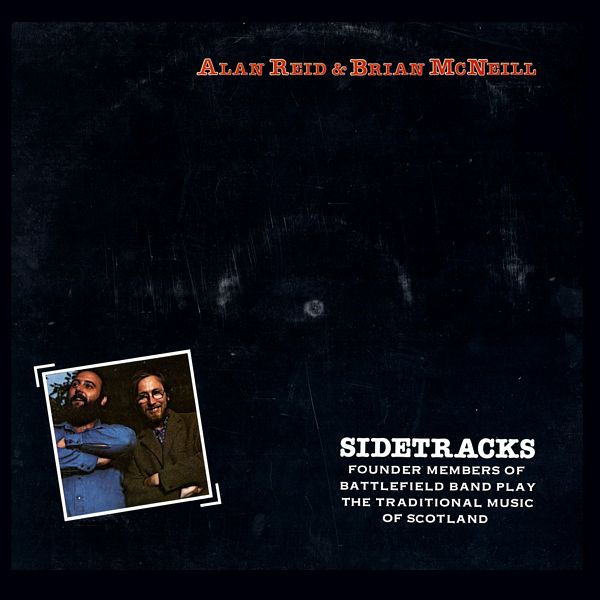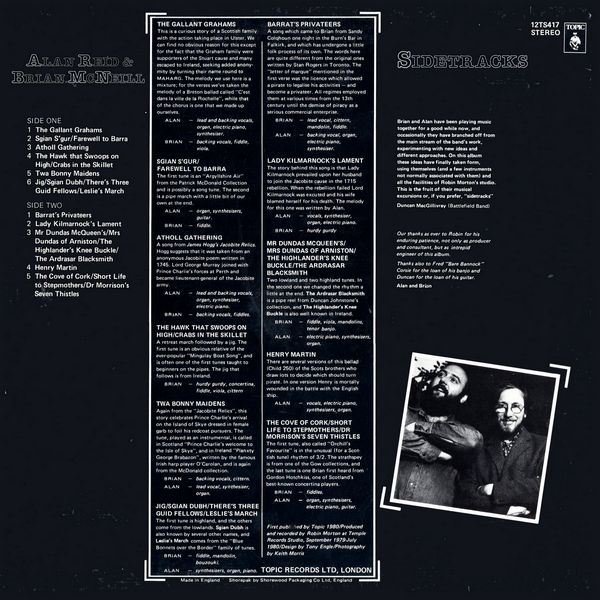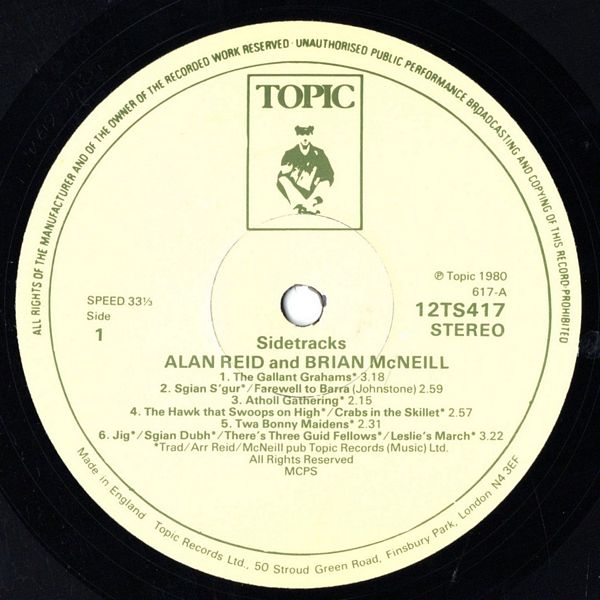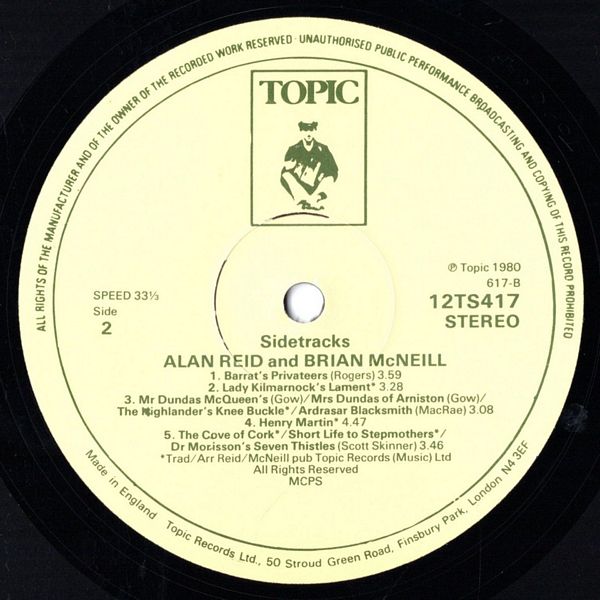
 |



|
Sleeve Notes
Brian and Alan have been playing music together for a good while now, and occasionally they have branched off from the main stream of the band's work, experimenting with new ideas and different approaches. On this album these ideas have finally taken form, using themselves (and a few instruments not normally associated with them) and all the facilities of Robin Morton's studio. This is the fruit of their musical excursions or, if you prefer, "sidetracks"
Duncan MacGillivray (Battlefield Band)
Our thanks as ever to Robin for his enduring patience, not only as producer and consultant, but as intrepid engineer of this album.
Thanks also to Fred "Bare Bannock" Corsie for the loan of his banjo and Duncan for the loan of his guitar.
Alan and Brian
The Gallant Grahams — This is a curious story of a Scottish family with the action taking place in Ulster. We can find no obvious reason for this except for the fact that the Graham family were supporters of the Stuart cause and many escaped to Ireland, seeking added anonymity by turning their name round to MAHARG. The melody we use here is a mixture; for the verses we've taken the melody of a Breton ballad called "C'est dans la ville de la Rochelle", while that of the chorus is one that we made up ourselves.
Sgian S'gur & Farewell To Barra — The first tune is an "Argyllshire Air" from the Patrick McDonald Collection and is possibly a song tune. The second is a pipe march with a little bit of our own at the end.
Atholl Gathering — A song from James Hogg's Jacobite Relics. Hogg suggests that it was taken from an anonymous Jacobite poem written in 1745. Lord George Murray joined with Prince Charlie's forces at Perth and became lieutenant-general of the Jacobite army.
The Hawk That Swoops On High & Crabs In The Skillet — A retreat march followed by a jig. The first tune is an obvious relative of the ever-popular "Mingulay Boat Song", and is often one of the first tunes taught to beginners on the pipes. The jig that follows is from Ireland.
Twa Bonny Maidens — Again from the "Jacobite Relics", this story celebrates Prince Charlie's arrival on the Island of Skye dressed in female garb to foil his redcoat pursuers. The tune, played as an instrumental, is called in Scotland "Prince Charlie's welcome to the Isle of Skye", and in Ireland "Planxty George Brabazon", written by the famous Irish harp player O'Carolan, and is again from the McDonald collection.
Barrat's Privateers — A song which came to Brian from Sandy Colqhoun one night in the Burn's Bar in Falkirk, and which has undergone a little folk process of its own. The words here are quite different from the original ones written by Stan Rogers in Toronto. The "letter of marque" mentioned in the first verse was the licence which allowed a pirate to legalise his activities — and become a privateer. All regimes employed them at various times from the 13th century until the demise of piracy as a serious commercial enterprise.
Lady Kilmarnock's Lament — The story behind this song is that Lady Kilmarnock prevailed upon her husband to join the Jacobite cause in the 1715 rebellion. When the rebellion failed Lord Kilmarnock was excuted and his wife blamed herself for his death. The melody for this one was written by Alan.
Mr Dundas McQueen's, Mrs Dundas Of Arniston, The Highlander's Knee Buckle & The Ardrasar Blacksmith — Two lowland and two highland tunes. In the second one we changed the rhythm a little at the end. The Ardrasar Blacksmith is a pipe reel from Duncan Johnstone's collection, and The Highlander's Knee Buckle is also well known in Ireland.
Henry Martin — There are several versions of this ballad (Child 250) of the Scots brothers who draw lots to decide which should turn pirate. In one version Henry is mortally wounded in the battle with the English ship.
The Cove Of Cork, Short Life To Stepmothers & Dr Morrison's Seven Thistles — The first tune, also called "Orchill's Favourite" is in the unusual (for a Scottish tune) rhythm of 3/2. The strathspey is from one of the Gow collections, and the last tune is one Brian first heard from Gordon Hotchkiss, one of Scotland's best-known concertina players.
Jig, Sgian Dubh, There's Three Guid Fellows & Leslie's March — The first tune is highland, and the others come from the lowlands. Sgian Dubh is also known by several other names, and Leslie's March comes from the "Blue Bonnets over the Border" family of tunes.